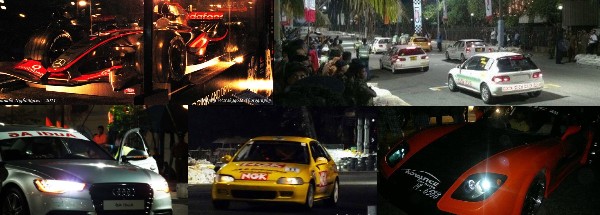 |
| Night Races – a pet project of Namal Rajapaksa |
Tisaranee Gunasekara
“Please. How will we live if you steal from us?”
-Dave Eggers (What is the What: The Autobiography of Valentino Achak Deng)
The price of petrol went up, again, as Colombo was being geared up, on presidential orders, by the military for the Night Races – a pet project of Namal Rajapaksa.
Colombo, this weekend, is a microcosm of the Rajapaksa present afflicting us and an omen of the Rajapaksa future awaiting us. The Night Races are symbolic and symbiotic of Rajapaksa Sri Lanka, a land in which the very worst features of capitalism and feudalism commingle in a toxic concoction, sweetened with generous doses of populist nationalism.
The most destructive Rajapaksa meme is not sadism (though that impulse too is not absent) but indifference. The Rajapaksas are as indifferent to public welfare in the South as they were indifferent to public safety in the North.
The Night Races ensure an evening of exhilaration for the few, bought at enormous inconvenience for the many and immense cost to the country. The Night Races promote a sport which is non-democratic by nature (motor-racing is the antithesis of most other sports which are open all citizens; any child can play cricket with a few sticks and a rubber ball; a toy racing car is beyond the means of most Lankan families). The Night Races are also utterly incompatible with Lankan geographic and demographic realities such as small towns/cities with dense populations.
The Night Races have no national fan base; most Lankans are unaware of their existence. Their purpose is not to showcase Lankan talent or to satisfy Lankan sporting palate but to satiate a whim of some of the younger Rajapaksas. The Presidential offspring in particular seem to nurture quite a passion for fleet cars and for racing. In and of itself, this is a perfectly comprehensible phenomenon, something common to youth across countries and cultures, and across time. Unfortunately, the very nature of familial rule has turned that perennial, and essentially harmless, youthful desire into a national malaise. That is because in patrimonial oligarchies such as Sri Lanka, the youthful passions of a ruler’s progeny inform and shape national policies, consume national income and discommode the nation.
The Night Races constitute a crasser manifestation of a development model which is motivated not by national needs or capacities, but by Rajapaksas interests and desires. Billions are being spent on unnecessary highways while lack of funds has turned 900 railway crossings into death traps. There is no profit and no glory for the Rajapaksas in building rail gates. Rail gates can save ordinary lives, but that saving ordinary lives, Sinhala, Tamil or Muslim, is not a Rajapaksa priority. The only reason Sri Lanka entered the ‘space age’ is because the youngest presidential offspring wants to become the country’s first and the world’s youngest astronaut. Again in and of itself there is nothing wrong in forming such mountainous ambitions. The young must dream, including impossible dreams. The problem is when presidential fathers gut national wealth to satisfy the outlandish whims of their sons.
The Night Races are not only being held in the country’s busiest city; they are being held in a manner which maximises public inconvenience, unnecessarily. Half the roads leading into and out of Colombo are closed, this weekend; and Friday’s road-closure, at the time the city’s working population was heading home, created mammoth traffic jams. If the Rajapaksas are intent on having night races, they could have done so in a less populous suburb, thereby minimising public inconvenience. But public convenience or inconvenience would have never figured in the Rajapaksa calculations. Their sole consideration is their power and their interests, their needs and their wants.
The most destructive Rajapaksa meme is not sadism (though that impulse too is not absent) but indifference. The Rajapaksas are as indifferent to public welfare in the South as they were indifferent to public safety in the North. They do not care. They did not care how many innocent Tamils they killed, in their pursuit of military victory; they do not care what hardships they impose on their own Sinhala-Buddhist base, in their pursuit of power and glory.
A pathological indifference to repercussions (and to the consequent plight of the poor and the powerless) is the deadly thread which connects many a Rajapaksa deed, from the ‘humanitarian operation’ to the Colombo beautification programme, from the impeachment to the Night Races.
Pathological Indifference
Vellupillai Pirapaharan’s commitment to Tiger Eelam was rock-solid. And in his pursuit of Tiger Eelam he did not hesitate to sacrifice Tamil lives and Tamil interests and undermine Tamil future. His single-minded commitment to a Tiger Eelam under his sole control not only made him indifferent to the horrific plight of ordinary Tamils; it made him deaf and blind to the harm he was causing to the Tamil nationalist project. For him Tamils were pawns, to be used and discarded, in propelling his megalomaniacal project forward.
Only a leader who is pathologically indifferent to the wellbeing of his people could have turned his own people into human hostages.
The Rajapaksas too regard the Sinhalese the same way Mr. Pirapaharan regarded the Tamils. The Rajapaksas need the Sinhalese the same way Mr. Pirapaharan needed the Tamils. The Sinhalese are the main pawns in the Rajapaksa project of familial rule and dynastic succession, and in that capacity, the Sinhalese are indispensable to the Rajapaksas. But the safety or wellbeing of Sinhala people is of no consequence to the Rajapaksas.
This dissonance between Rajapaksa rhetoric and Rajapaksa action is clearest in the indifference the Siblings display to the actual welfare of flesh and blood military personnel, even as they venerate the war-hero in the abstract. For instance, even according to official sources, nearly 400 soldiers have committed suicide, post-war. “A majority of soldiers who committed suicide were suffering from Adjustment Disorder (AD). Only five of them were those under treatment for Post-traumatic Stress Disorder (PTSD), military Spokesman Brig. Ruwan Wanigasooriya said” (The Island – 24.12.2012). Though the army is said to be taking remedial measures, for many it will turn out to be too little too late. If the inevitable psychological issues were acknowledged and dealt with as soon as the war ended, most of those 400 lives could have been saved. But for the regime building victory monuments and holding victory parades were more important than attending to the human needs of the men and women who made that victory possible. For the Rajapaksas, lionising the army in the abstract will always be more important than helping ordinary soldiers in real life.
The maximalism of fanatical leaders includes a visceral unwillingness to contemplate a life without them. Adolf Hitler believed that a Germany destroyed was better than a Germany defeated. Vellupillai Pirapaharan tried to take as many Tamils as possible down with him to the grave.
The Rajapaksas are taking the same annihilationist path. They are clearly determined to destroy any institution which stands in their way, including the most august. In their pursuit of power, nothing is inviolable, nothing is sacrosanct. This annihilationist mindset is evident in their orchestrated attacks on the entire judiciary, in the dangerous talk about a Hulftsdorf-coup, and in their attempt to cause a devastating schism in the Bar Association.
For the sake of Rajapaksa power, the Rajapaksas will not hesitate to undermine/destroy anything, including the unitary state they purport to venerate.
